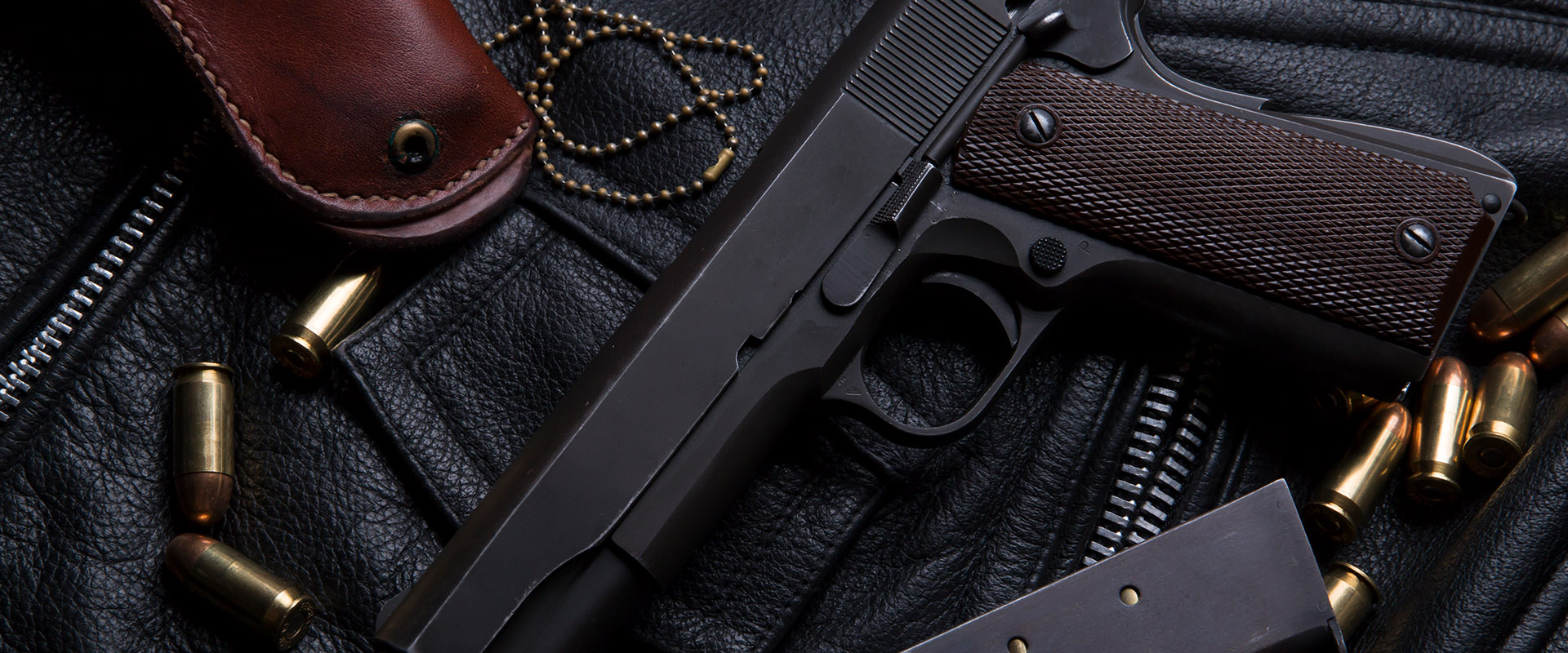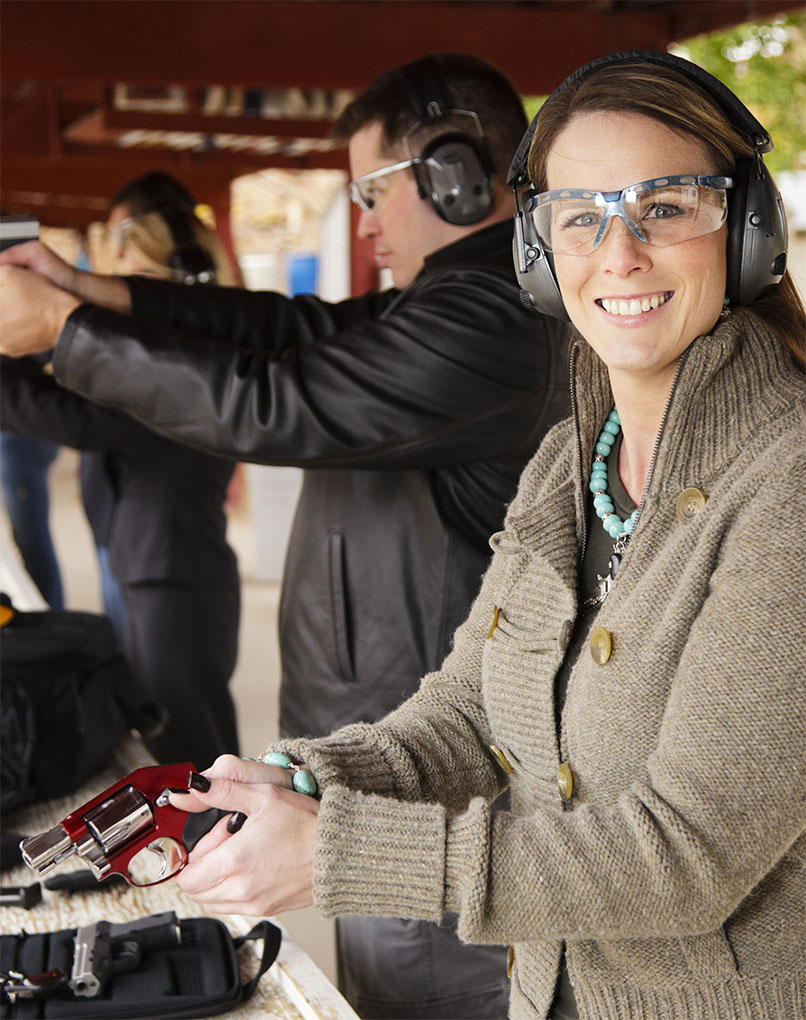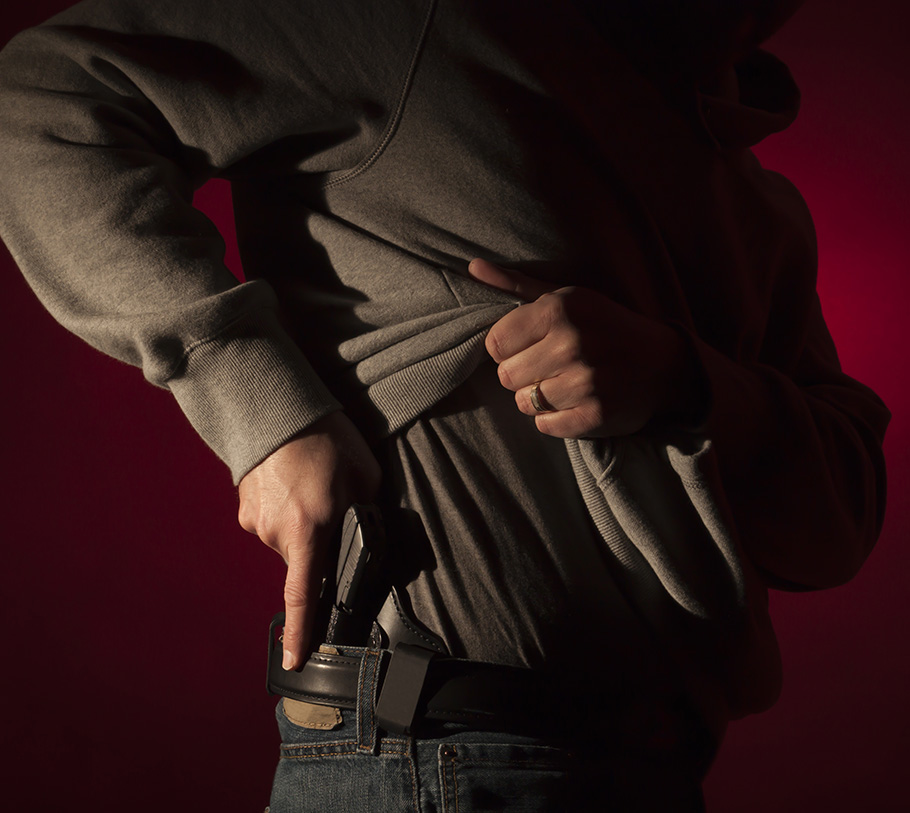So, you’re considering buying your first firearm. Perhaps a pistol or revolver, but you’re just not sure yet. That’s a good thing because a firearm should never be an impulse purchase (okay, certainly not the first one). There are good reasons to buy a firearm. There are good reasons not to. Because owning a firearm, any firearm, comes with responsibilities. And you need to understand and be willing to assume those responsibilities before purchasing.

Before You Buy Your First Firearm
PLEASE READ THIS
Maybe You Shouldn’t Own a Firearm
If you’re thinking of buying one, but you know it’s just going to be a permanent resident in a closet somewhere, maybe you should reconsider. Buying a firearm just to store somewhere, never to be seen again, is the least of the reasons not to buy, but it’s still a good reason not to buy. In the event of a home break-in, you won’t be able to retrieve it quickly enough, know if it’s loaded, or if it’s in good working order, and most importantly, know how to use it.
Recommendation: Do not purchase. But read on.
If you know that under no circumstance will you ever pull the trigger, that you only intend to flash it in the event of a break-in, please reconsider. It’s possible to get away with “just want to scare a burglar away” scenario with a pump shotgun because a pump shotgun being cocked is the second most recognizable sound in the world. But a pistol, not so much. The problem is you must reveal yourself for a burglar to see your pistol. If you’re not prepared to use it, things could go badly. It could end up being stolen along with the rest of your stuff, and you’ve just donated your firearm to a criminal.
Recommendation: Do not purchase. But read on.
If there is domestic abuse, alcohol or drug issues, a suicidal member in the household, or any instability that could escalate to a dangerous situation with the addition of a firearm, buying is not a good idea. Irresponsible, out-of-control teenager(s) is another reason to put off the purchase. Convicted felon at home, not a good idea to buy a firearm. If you’re considering the purchase of a firearm for self-defense from another member of the household, get help. There are better solutions.
Recommendation: Do not purchase and please, get professional counseling.
I'm Not One of Those, So I Should Buy?
If you believe there may be a chance of break-in or attack on your family, in your home (we’ll get to who should carry), you most certainly should consider owning a firearm. If there have been burglaries or home invasions in your area, or increased acts of violence, then yes, you should probably buy a firearm. If you’re alone, whether it’s because of divorce, empty nester, or for whatever reason, and you want a bit more security than you can physically impose yourself, you should consider purchasing a firearm. Over 1.5 million homes are burglarized each year and the criminals who commit these crimes are often armed. When people are home, these incidences can quickly turn violent. Approximately 28% of these burglaries occur while someone is at or arrives home, and about one-fourth of those, a household member became a victim of violence in their own home.
Recommendation: Purchase. And read on.
This one is an easy decision. If your job requires you to use, carry or simply own a firearm, be it you’ve joined the police force, become a security guard, or any position where you must be comfortable and familiar with a firearm, it’s time to buy. If you use a firearm at work, there may be repercussions that spill over to your home (police must worry about this), so you should have a home-defense firearm.
Recommendation: Purchase. And read on.
If you simply want to participate in the sport of shooting, be it at an indoor or outdoor range or on your own property (where laws and common sense allow), then you should purchase. Gun ranges have become the “bowling alley” of our generation and tournaments are popping up everywhere. Cowboy shooters also fall into this category. Many manufacturers build pistol and revolvers specifically for competition. There have never been so many options readily available for the sport shooter. And sport shooters tend to be among the better trained and responsible of all categories of gun owners, along with active-duty law enforcement personnel. Another no-brainer.
Recommendation: Purchase. And read on.
Firearms are interesting machines. The requirements are demanding. The fact that a firearm can be made to be reliable, and attractive, with the minimum of moving parts, stand up to enormous pressures and stresses, is a marvel of human engineering. The more you understand how a firearm works, the more you must admire the design of these “simple” machines. Some collect clocks, others, firearms. Same thing.
Recommendation: Purchase. And read on.
There are some who find it their patriotic duty to own a firearm. That to honor the Constitution, one should own firearms. In Kennesaw, Georgia, it’s a city ordinance. If your reason for wanting a firearm is a belief that you must, should you buy? Yes. As long as you understand, and are willing and able to fulfill your obligations as a responsible gun owner. If you believe, for whatever reason, that you must, should or just want to own a firearm, in the United States of America, you can. We enjoy this as a fundamental right, not as a gift from some politicians. If you don’t fit into any of the “scenarios to not own”, then feel free to purchase a firearm.
Recommendation: Purchase. And read on.
Well, What about Carry?
Having a firearm at home, for whatever reason, is different from buying one to carry on your person. If you intend to “carry”, the obligations to train and to be comfortable with your firearm are exponentially increased over just having one at home. If you are not willing to take on the responsibility that comes with carrying a firearm on your person, in public, please, don’t purchase a firearm from me.
It should be noted that in most states, your car is an extension of your home and having a firearm in your car does not require a carry permit or license. Please check with your state laws and regulations. Some states mean to deprive you of your basic rights and you need to fully understand their laws because states that limit freedom tend to impose severe consequences on citizens who try to exercise their rights. Work to run the politicians who would rule you out of office, or just move to a better state.
If you’ve made the decision to “carry”, there are many factors to consider. What type of carry firearm works best? Semi-auto pistol or revolver? What size? What caliber? Some of the questions about home-based firearms are the same for carry, with a few exceptions. The size and weight of a carry weapon are far more critical than for a home-based firearm. How will it be carried? How big is too big? Will it be holstered or in a handbag (there are handbags made specifically for carry)? Shoulder, outside the waistband or inside the waistband? What weight can be comfortably carried for extended periods of time? How big before it prints (shape shows through the clothing)?
A lot will depend on your size and weight. A large person will be more comfortable with a large frame revolver than a petite person. Some semi-auto pistols (and some revolvers) require a fair amount of hand strength to cock or fire. Revolvers tend to be bulkier than pistols but are more reliable. Pistols hold more ammunition and are faster and easier to reload. There’s a lot to consider.
So, Where Are We?
Time to decide. If you’re still reading this, you’ve more than likely decided to purchase. Time to deal with the really hard part.
What Type of Firearm Should I Buy?
The truth is, you should buy what is the most comfortable for you.
Not just physically comfortable, but mentally comfortable.
If you demand absolute reliability, the revolver is your choice. Revolvers do not suffer feed of jam issues, they simply work every time you pull the trigger. That is until you’ve fired off the five, six, or seven rounds it holds. The bulk isn’t an issue for you and with the right caliber, either is the limited capacity.
Recommendation: Purchase a revolver. And read on.
You need a small, lightweight firearm and you’d prefer higher capacity and ease of reloading. You want to be able to carry your firearm in multiple situations, with a large variety of clothing options or simply prefer an inside-the-waistband holster. You probably should look at pistols.
Recommendation: Purchase a semi-automatic pistol. And read on.
How Many is Too Many?
This is where you can get into serious debate with the gun-haters. Those who would limit or abolish your rights always ask, “why does anyone need one, or more than one?” There are legitimate reasons for owning multiple sidearms, but the number one answer is, because you can.
But why should you. A firearm is a tool. And like other tools, are designed for multiple purposes. If you own one hammer, its usually a general claw hammer that you use for any purpose requiring a hammer. But hammers, like firearms, come in many configurations and are designed for specific tasks. There are general nailing hammers, with straight and curved claws, framing hammers, brick hammers, welding hammers, roofing hammers, ball peen hammers, sledge hammers, tack hammers, dead blow hammers, auto body work hammers, etc. A hammer with a fiberglass handle feels differently than one with a wood handle. Some of us own over a dozen hammers. Some get by with one. But those who want to have the right tool for the job and choices within some categories, will own several. The same is true of handguns.
If you buy your first handgun (a handgun or side arm is a pistol or revolver), and love it from day one, and it fulfills your needs for owning one, you can stop right there. But, as you train (practice firing at a range, etc.) and become more comfortable with a handgun, you might consider a larger caliber or frame. You might decide you want to add one to keep in your car. An upstairs pistol and a basement revolver. The more familiar and comfortable you become with your firearm, the more likely you will want to purchase another one. Seldom, when purchasing multiple firearms, does one add duplicates of previous purchases, more likely it’s to add different firearms to what can become a collection.
So, the answer is, there is no such thing as too many. And anyone who proposes limits to how many firearms an individual may own, is ignorant of too many factors to be taken seriously. Regardless of which “reason” motivates your purchase, the truth is, most of us would fall under multiple categories and if required or desired, can and should consider owning multiple firearms.
Recommendation: Purchase as many as you like. And that’s the bottom line.
So, What About Training?
If you decide to purchase a firearm, then you’ve decided to own something that requires you to become proficient and responsible before putting it in operation, be it in your home or on your person. Just as with an automobile you wouldn’t want to drive on the streets until you’ve practiced in an isolated place and learned to operate it safely. Practice leads to proficiency, confidence, and safety.
Lucky you, there are more opportunities for training available now than ever before (that “bowling alley” of our generation thing said earlier). There is training available at most gun ranges, in group or private settings. There is specialized training for the different roles your firearm will serve. And there is information and services that will inform you of when you should use your firearm and what to expect if you ever must. The truth is, there has never been a better, safer, more informed time to own a firearm. Most gun range employ active-duty and retired law enforcement personnel. These are some of the most highly trained and qualified firearm experts you will ever meet. They are usually eager to pass on their knowledge and there is much to learn from them. Many have faced situations requiring drawing of their weapon and the ability to make judgements to stop an act of violence while keeping public safety at the forefront. These are skills that only come with the finest training available and constant practice. These same people are sometimes the instructors leading the classes. There is little or no excuse for not receiving training in the proper use and care of your firearm. You will most likely be in classes with people who are just like you, first time gun owners who have decided to have the tools and skills needed to protect themselves and their families.
Recommendation: Purchase a firearm. Practice. Practice. Practice.


I hope this has been informative. It’s impossible to address ever situation there is, but, at least in general terms, this hopefully has addressed many.
Requirements for Purchasing a Sidearm
Age Requirement:
Dealers may not sell or deliver a handgun or ammunition for a handgun to any person the dealer has reasonable cause to believe is under age 21. The minimum legal age for rifles and shotguns is 18.
You have to be 21 to purchase a handgun.
Citizenship Requirements:
U.S. citizens, except as noted below, can legally purchase a firearm. However, non-citizen cannot purchase a firearm from a federally licensed firearms dealer unless they have been a resident of their state for 90 days.
It’s clearer to list who can’t.
Who Can’t Buy One?
The following classes of people are ineligible to possess, receive, ship, or transport firearms or ammunition:
- Those convicted of crimes punishable by imprisonment for over one year, except state misdemeanors punishable by two years or less.
- Fugitives from justice.
- Unlawful users of certain depressant, narcotic, or stimulant drugs.
- Those adjudicated as mental defectives or incompetents or those committed to any mental institution.
- Illegal aliens.
- Citizens who have renounced their citizenship.
- Those persons dishonorably discharged from the Armed Forces.
- Persons less than 18 years of age for the purchase of a shotgun or rifle.
- Persons less than 21 years of age for the purchase of a firearm that is other than a shotgun or rifle.
- Persons subject to a court order that restrains such persons from harassing, stalking, or threatening an intimate partner.
- Persons convicted in any court of a misdemeanor crime of domestic violence.
- Persons under indictment for a crime punishable by imprisonment for more than one year are ineligible to receive, transport, or ship any firearm or ammunition. Under limited conditions, relief from disability may be obtained from the U.S. Secretary of the Treasury, or through a pardon, expungement, restoration of rights, or setting aside of a conviction.
State Laws
State laws regulating firearms are laxer in some states than in others. In some states, there is no permit required, other states require you obtain a permit, and still others make it all but impossible to get a permit and make it difficult to purchase. It is up to you to check on the laws in your state. These are easy to find. The NRA (https://www.nraila.org/gun-laws) has a state-by state reference. Your state attorney general’s office should be able to provide detailed information.
The NRA
The NRA (National Rifle Association) has many programs that provide training and support for citizens who want to take responsibility for their own safety. Consider it. They work to preserve our rights and their membership most likely includes people you already know.
How Can You Get Your Online Purchased Firearm?
Unlike buying from most online stores, purchasing a firearm online does not mean a firearm will be delivered to your home. Firearms can only be shipped between licensed dealers (FFL holders) or their agents. What this means is that the firearm must be shipped to a licensee (of your choice) and you will have to fill out a form 4473 and have a background check run (unless you have a government-issued carry permit). Your identification will be checked and verified and the firearm serial number will be logged in the licensee’s log book. The process is exactly the same whether you buy your gun online, in a retail store or at a gun show, where, contrary to liberal propaganda, you will fill out the 4473 form and have a background check run. Most, if not all, gun ranges are licensees and there are gunsmiths as well. There usually is a transfer fee. (Please note, if you are in the same state where the online merchant is based, you will pay state tax.)
© 2021 Full Metal Mayhem LLC. All rights reserved.
